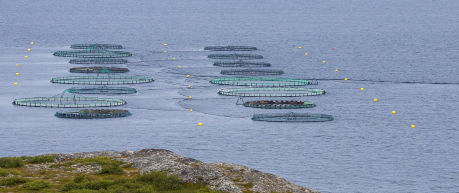Tuesday 9th August 2022, 1:00pm
Representatives from the aquaculture sector, academia, and environmental and government organisations participated in a virtual roundtable discussion co-hosted by the Sustainable Aquaculture Innovation Centre (SAIC) and Innogen Institute on how best to implement innovations to improve aquaculture sustainability.

Innogen's founding director, Professor Joyce Tait, opened the meeting by introducing Innogen's recent report on fish farming in Scotland, funded by the Open University in Scotland, and a policy paper that makes a series of recommendations for governments and other stakeholders to optimise the contribution of salmon farming to climate and environmental policy.
Participants agreed on the need to work together (across the sector and with regulators) to create a policy environment that supports the innovations needed to achieve net-zero targets and protect biodiversity. Key areas where innovation could have a major impact include feed, waste recycling, facilities, and animal health.
The use of novel, sustainable ingredients in aqua feeds, such as single-cell proteins and insects, has the greatest potential to contribute to both net-zero goals and biodiversity protection. Some of these ingredients are now available in commercial quantities, but production in general needs to be expanded. Growing more crops for feed locally has also been suggested as an approach to support the sustainable growth of aquaculture in Scotland.
Zero Waste Scotland is working with companies to identify waste uses that support a circular economy. Segregating waste streams and modelling different scenarios can help optimise each waste stream.
Improvements in animal health will enhance survivability and reduce overall waste. Research into advanced disease surveillance systems, vaccines and genetic technologies can contribute to reducing the burden of disease, decreasing the need for pharmaceuticals, and making aquaculture more efficient.
The development of hydrogen-fuelled vessels for servicing fish farms and establishing an innovation site on which the sector and academia could collaboratively explore new opportunities were also suggested as valuable avenues to pursue.
Thanks to the positive engagement of all participants, the session was very productive, marking the start of a more frequent dialogue to stimulate positive change and potentially unlock some of the regulatory and policy challenges facing the growth of the sector.
“We’re grateful to all those who contributed to this workshop. It feels like there is a real appetite for collaboration among key players from across the aquaculture sector that now needs to be harnessed to benefit not only the Scottish economy but also aid the delivery of climate change and biodiversity policies.”
Joyce Tait, Founding Director of Innogen at The University of Edinburgh“Innovation will be critical to delivering an even more sustainable aquaculture sector, reducing its environmental impact while increasing production to meet the needs of a growing global population. I was delighted to help host and take part in the discussion, bringing together a wide set of participants with an interest in aquaculture and setting out a variety of positive steps we can all take towards building a collaborative future for the sector.”
Sarah Riddle, Director of innovation & engagement at SAICThe Sustainable Aquaculture Innovation Centre (SAIC) is one of seven innovation centres introduced by the Scottish Government to drive growth in areas of key economic and social importance.
Professor Joyce Tait was one of the speakers at A3 Scotland 2022, an inaugural not-for-profit conference for the Animal Health, Agritech and Aquaculture (AAA) sectors, hosted in Edinburgh in April 2022 with a pre-conference tour of Easter Bush Campus.